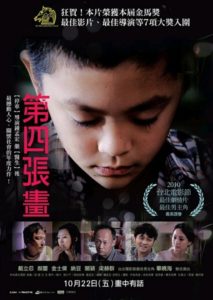The Fourth Portrait
第四张画
Taiwan, 2010, colour, 1.85:1, 102 mins.
Director: Zhong Menghong 钟孟宏.
Rating: 6/10.
Often atmospheric study of a boy’s lonely emotional life is diluted by a lack of dramatic focus.
An economically depressed coastal region of Taiwan, the present day. Ten-year-old Zhu Wenxiang (Bi Xiaohai) has to care for himself after his father dies in hospital, and his only friend is the school’s caretaker (Jin Shijie). His mother Wu Chunlan (Hao Lei), whom he hasn’t seen for years, takes him to her new home with her second husband (Dai Liren), an unfriendly type who runs a small fish stall in a night market. The couple have a baby of their own, and Wu Chunlan, who came from China 10 years ago, works at night as a hostess in a ramshackle KTV girlie bar. Ignored by his stepfather, Zhu Wenxiang falls in with a petty thief (Lin Youzhi), though he’s still plagued by dreams about his elder brother Zhu Xiaoyi (Lin Shengxiang), who left with his mother when she divorced and who mysteriously disappeared three years ago.
REVIEW
After his precision-crafted urban black comedy Parking 停车 (2008), Taiwan writer-director Zhong Menghong 钟孟宏 moves to the countryside with his somewhat different second feature, The Fourth Portrait 第四张画, an interior drama of a boy’s lonely emotional life that exists on a plane somewhere between dream and reality. The setting is real enough – a lethargic, economically backward community, with petty criminals, seedy KTV joints and morose locals – but the point-of-view is anything but. Though a clever student, with a special gift for drawing, young Zhu Wenxiang (played with quiet defiance by Bi Xiaohai 毕晓海) drifts through an unfriendly universe in which his stepfather is hostile to him, his tough Mainland-born mother is doing her best to make something of a rotten life, and his only panacea is finding what happened to his long-lost elder brother. Parking inhabited a similarly bleak world, populated by petty criminals and prostitutes, but was energised by its black comedy and After Hours-like structure. The Fourth Portrait, set in a rural world very familiar from 1990s Taiwan cinema, offers much less hope.
It’s an elusive film which keeps slipping in and out of focus – part family drama, part Turn of the Screw-like “ghost” story, part separate character studies. Mainland actress Hao Lei 郝蕾, almost unrecognisable from her big-screen debut in Summer Palace 颐和园 (2006), makes the mother a powerful study of emigree disillusion – a Mainlander who came to Taiwan in search of a better life but has ended up in a depressed backwater servicing petty gangsters and re-married to a half-psychotic loser. As the husband, actor-director Dai Liren 戴立忍 [Leon Dai] (The Cabbie, 运转手之恋, 2000; Parking) is similarly impressive as a human grenade who’s always on the verge of pulling the pin. Either of these characters could have been a movie of their own, as too could the grumpy but kindly school caretaker (veteran actor Jin Shijie 金士杰) who still dreams of Shanghai 50 years after he left. Because of the strength of these characters, the more vaguely defined boy often seems like a spectator in his own movie.
The gradually developing central drama – what happened to the boy’s elder brother? – hangs over the film like a ghost that won’t go away, and at the halfway point, in a powerful scene between the mother and the boy’s teacher (nicely played by actress Guan Ying 关颖 [Terri Kwan]), it finally seems to be driving the movie. But the focus then slips again and, instead of going with the flow, Zhong the dramatist takes second place to Zhong the director. Parking also had its share of unnecessary stylistic affectations, but in a far more fragile structure like The Fourth Portrait they dilute the drama: a too-long tracking shot here, a too-slow scene there, and a general desire to grudgingly feed the audience information. The movie is always engrossing, but ultimately frustrating.
CREDITS
Presented by 3 NG Film (TW). Produced by Cream Film Production (TW).
Script: Zhong Menghong, Tu Xiangwen. Original story: Zhong Menghong. Photography: Nakashima Nagao [Zhong Menghong]. Editing: Luo Shijing. Art direction: Zhao Sihao. Costumes: Zhou Xiaochun. Sound: Luo Shijing, Du Duzhi.
Cast: Bi Xiaohai (Zhu Wenxiang), Jin Shijie (Zhang, school caretaker), Hao Lei (Wu Chunlan, Zhu Wenxiang’s mother), Dai Liren [Leon Dai] (Zhu Wenxiang’s stepfather), Na Dou [Lin Youzhi] (short fat man, petty thief), Guan Ying [Terri Kwan] (Huang, teacher), Liang Hequn (policeman), Luo Bei’an (fat uncle), Chen Xisheng (Li, boss), Bai Yun (lounge-bar gent), Chen Tiande (Zhu Wenxiang’s father), Shi Hengli (Zhu Wenxiang’s elder brother), Lin Shengxiang (Zhu Xiaoyi, Zhu Wenxiang’s elder brother), Liu Zhenxiong (hospital doctor), Zheng Yipin (hospital employee), Chen Chiakui, Chen Zongjin (men at funeral ceremony), Li Muxing (MC), Jiang Zhiyuan (Zhu Wenxiang’s classmate), Chen Guanjia (Zhu Wenxiang’s younger brother), Li Lixiang (short fat man’s younger brother), Zhang Shihui (tall thin man), Chen Menghong (KTV bodyguard), Zheng Yixiang (KTV girl).
Premiere: Taipei Film Festival (Co-Opening Film), 25 Jun 2010.
Release: Taiwan, 22 Oct 2010.
(Review originally published on Film Business Asia, 5 Aug 2010.)
